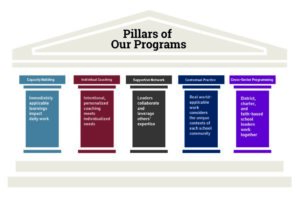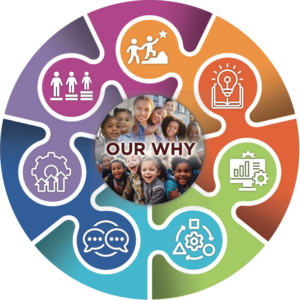Leadership Development that Works

PASL programs are unparalleled because our approach to leadership development is results-driven and evidence-based.
We take an intentional approach to professional development, offering a continuous system to develop school and system leaders across roles and throughout their careers so that they can leverage skill sets and implement best practices with fidelity.
All of our programmatic experiences are delivered via five Program Pillars–a tested framework that enhances effectiveness to maximize impact–with a focus on the leadership competencies proven to drive success and enhance student achievement.

PASL Leadership Competencies


Equity
Leader understands the historical and contemporary manifestations of racial, sociocultural and economic inequities and engages self and staff in continuous learning about the contemporary manifestations of inequities in the school and district.

Continuous Improvement for Student Success
Serves as an agent of change and continuous improvement to promote each student’s academic success and well-being.

Instructional Leadership
Leads teachers in implementing a dynamic, culturally relevant curriculum integrating: equity and research based instructional practices; strategic use of data; and the inclusion of modern technologies grounded in a compelling future-ready vision for students.

Adaptive Leadership
Leads by applying systems thinking to manage complex challenges. The school leader is explicit in modeling equity and inclusion principles by engaging stakeholders transparently, fostering a culture of continuous care, improvement and empowerment, and leveraging cross-cultural communication, data literacy and student voice.

Systems & Operations
Leads strategically with a caring approach through equitable resource allocation, data-driven decision-making, compassionate crisis management, and thorough operational analysis, prioritizing staff development, support, and retention to foster a supportive and nurturing environment, alongside efficient facility and technology management, transparent communication, and rigorous auditing to ensure instructional excellence and operational efficiency.

Professional Learning
Leader builds teacher and staff capacity through high quality, school-based professional learning programs and activities focused on: subject matter; equity-based teaching strategies; data-driven improvement of instructional practices; nurturing collaborative learning communities; and promoting an improvement and innovation culture.

Family & Community Engagement
Leader understands research-based family and community engagement practices that support student success and uses this knowledge to design and maintain family and community partnerships that link academic learning to the community’s resources such as culture, language, and ethnicity.